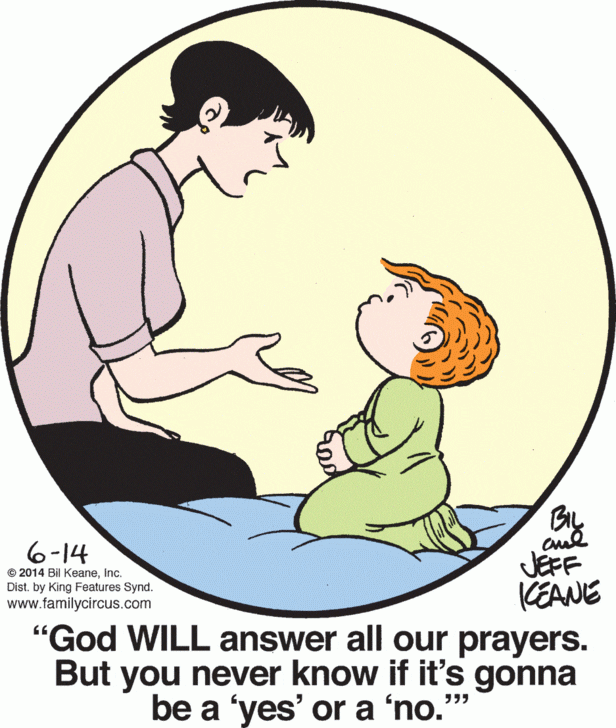Hemant Mehta is right — this Family Circus cartoon offers the “least helpful theological advice ever”:
Granted, picking on Family Circus is low-hanging fruit. The treacly fixture of the comics page is usually only good for a laugh if you disregard the caption and replace it with Charles Lavoie’s proposed universal New Yorker cartoon caption. (In this case, that’s funnier if you make it Jeffy’s response to his mom.)
But as is often the case, this cartoon is recycling a common platitude — a bit of popular folk-wisdom I’ve heard hundreds of times in church, Sunday school and other Christian settings. You’ve probably heard dozens of variations of this too: God answers every prayer. Sometimes God answers Yes and sometimes God answers No.
This proverbial teaching on prayer is, as Hemant says, pretty useless. But it also presents a really warped and weird idea of what prayer is.
Specifically, it stunts and reduces prayer to a series of Yes or No questions. Those are the rules for panelists on What’s My Line? But that isn’t what prayer means. Prayer certainly can include requests that might be the sort of thing that could be responded to with a yes or a no, but that’s at most a tiny fraction of what Christians and Jews mean when we speak of prayer.
Just look at the Bible. It’s full of prayers. The overwhelming majority of those prayers are not Yes-or-No questions or requests. Most prayers aren’t questions at all, and even most of those that are don’t lend themselves to a simple yes/no response. “How long, O Lord? — Yes or No?” Huh?
We can find isolated examples of that kind of thing. “Will you destroy the whole city for lack of five?” Abraham asked God. That was a yes-or-no question. And Abraham, unlike most of us, received a direct, verbal reply directly from God. (Abraham received such a direct response because, unlike most of us, he had just welcomed God Almighty into his house where he had served Them a nice meal of non-kosher cheesesteaks.)
But let’s look at the prayer Jesus taught his followers to pray:
Our Father in heaven, hallowed be your name.
That’s not a question.
Your kingdom come. Your will be done, on earth as it is in heaven.
That’s not a question either. It’s more of a pledge. We can think of it as partly a request, but only if we also recognize that it’s also a promise we’re making. In any case, it’s not a binary, yes-or-no question.
Give us this day our daily bread.
Not a question, more of a demand, but I suppose that amounts to the same thing, since this demand could entail a binary yes/no response from God.
And forgive us our debts, as we also have forgiven our debtors.
Another demand-style request, but this one involves us making a deal. And according to the same Jesus who taught us this prayer, God will always say Yes to this bargain. God will always agree to forgive us (Yay!) … in precisely the same measure and fashion in which we forgive others (wait … what?).
Also, too: Jubilee. Again. It’s always all about the Jubilee.
And do not bring us to the time of trial, but rescue us from the evil one.
Another demand that could be met with a yes/no reply, I suppose. And I’ll stop quoting from Matthew’s Gospel here to add the bit we Protestants tack on here at the end:
For thine is the kingdom, and the power, and the glory forever, amen.
Again, that’s a statement, not a question.
Most prayer isn’t a question — certainly not a yes-or-no question. That isn’t what prayer is. That isn’t what prayer is for.
Or let’s consider another prayer — one that it’s more likely young, generically Protestant Jeffy has just recited in the cartoon above:
Now I lay me down to sleep
I pray the Lord my soul to keep
If I should die before I wake
I pray the Lord my soul to take
And God bless Mommy and Daddy and Billy and Dolly and P.J. and Grandma …
Set aside the unfortunate Platonic dualism there and just consider how cruel it is to tell poor Jeffy that God might respond to any of that with a “No.”













